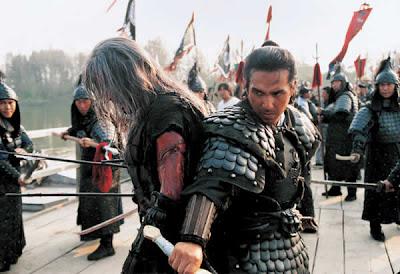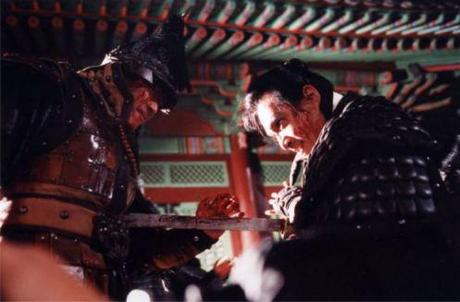I haven’t done a balls out Asian swordplay film in a while and since I have a certain affinity for the genre that has given me countless hours of entertainment, time to repay the favor. In the past I have talked about films like Shogun Assassin, The Sword of Doom and 13 Assassins, all of which are well done stories and offer up some the most crazy sword play battles ever. Today’s selection is no different, but this time we look at a film from South Korea instead of the usual Japanese sword fare. Sword in the Moon offers up a little bit of story to go along with a glorious buffet of actions scenes and sword clashes.

Directed by Kim Eui-seok, Cheongpung myeongweol (Sword in the Moon) is set in 17th century Korea, a chaotic time period in which the once Confucian society was threatened by an attempted Japanese invasion. The film is centered around an elite band of imperial guards hired to protect the old ways. Choi Ji-hwan (Choi Min-su) and Yun Gyu-yeob (Jo Jae-hyeon) make the backbone of the group, but unforeseen circumstances cause Yun to turn on Choi, the latter of which disappears from the scene after having been revealed as responsible for several murders. Yun’s search results in apprehending swordswoman Shi-yeong (Kim Bo-gyeong), Choi’s lover and partner in crime, who Yun tortures for information on Choi’s whereabouts. Eventually, Choi and Yun meet and prepare for a final battle. The film also features Lee Jong-su, Jeon Seong-hwan, Gi Ju-bong, Yu Yeon-su, and Kang Shin-il. ~ Tracie Cooper, Rovi
Boasting an impressive cast of Korean actors, Sword in the Moon doesn’t really do a whole lot with the characters as the director took the less dialogue is more dialogue approach. A lot of glares, yells and satisfying kill smirks seem to be the purveying emotional offerings of the movie. That isn’t bad really, since the film is centered around this unspoken bond between soldier and assassin as the film starts to flesh out over the course of the run time, the relationships and circumstances that have led to the confrontations. The story itself does become a bit clearer over time, since the early happenings of the film is jumbled and edited weird so as to add to the confusion of what’s going on. More back story, flashbacks and exposition does eventually give us a clear picture as to why the assassin is targeting the the imperial society and how Yun and Choi are connected to one another. Their bond does become whole and the emotional final sequences of the film are powerful to say the least.

While the story and plot is a bit short and could have been more developed, the meat of the film comes from stunning action sequences. There is probably a fight every other scene and they mostly take place at night, which doesn’t allow for more of the flowery visual kills. It makes a lot of sense to have them at night, since I assume that assassins work better at night, but a few of the scenes are too dark and the choppy editing kind of reduces the impact of a few sequences. I will say that the choreography is masterful and unique enough to standout from the rest of the pack. Several night battles look amazing with the glint of the moonlight reflecting off a sword after it has dispatched a foe. The intensity of the sword battles are perfect with the mix of rage and patience slowly battling one another between the two leads. I would say with it’s shortcomings, this still one of the better action films.
Overall Sword in the Moon is an above average sword play film, with a story that is straightforward, even if it is confusing in the beginning. Giving it some time will allow the characters and their limited interactions be fleshed out in flashbacks and necessary exposition. It does take almost the entirety of film to get to know all the characters and their motivation, so the non-patient viewers won’t be rewarded immediately. Still, the action scenes are top notch and well done, despite the choppy editing and overuse of night lights. South Korea has mad a very serious entry into the wuxia genre with a solid action film that has a strong payoff in the end.

